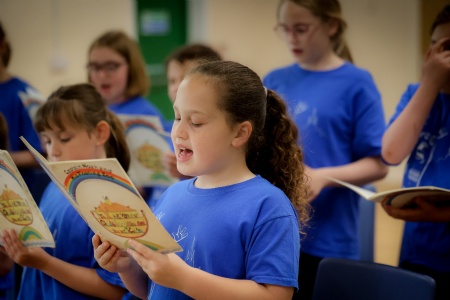Choirs vs Solo Singing

What Group Singing Offers That Solo Doesn’t
As an experienced music teacher, vocal coach and the leader of Lichfield Young Voices Choir, I’ve worked with both soloists and ensemble singers, and while each path offers its own rewards, there’s something uniquely powerful about group singing that solo performance simply cannot replicate. Choirs offer a rich blend of musical, social, and emotional benefits that help children grow not just as musicians, but as people.
Musical Growth Through Collaboration
Solo singing focuses on individual technique, interpretation, and expression. It’s a wonderful way for children to develop personal style and vocal control. But choir singing teaches something equally valuable: how to listen, blend, and collaborate. In a choir, children learn to match pitch, tone, and timing with others. They become aware of harmony, dynamics, and phrasing in a collective context.
This kind of musical teamwork sharpens listening skills and fosters discipline. Singers must follow the conductor, respond to cues, and adjust their voices to fit the ensemble. It’s a more complex musical environment, and it often accelerates learning in ways solo singing cannot.
Social Connection and Belonging
One of the most profound differences between solo and group singing is the sense of community. Choirs are built on cooperation. Every Young Voices rehearsal and performance is a shared experience, and that shared experience builds strong bonds between singers.
Children in choirs often form lasting friendships. They learn to support one another, celebrate each other’s successes, and work through challenges together. This camaraderie is especially important for children who may feel isolated or lack confidence. In a choir, they’re part of a team. Their voice matters - not because it stands out, but because it contributes to something greater.

Emotional Safety and Confidence
Solo singing can be intimidating, especially for children who are still finding their confidence. Standing alone on stage requires a level of vulnerability that not every child is ready for. Choirs offer a gentler introduction to performance. Children can sing without the pressure of being in the spotlight and gradually build the courage to take on more visible roles.
I’ve seen many children start in the back row of the choir, barely audible, and over time step forward to lead sections or sing solos. The choir becomes a safe space where they can grow at their own pace, supported by peers and guided by a nurturing environment.
A Broader Musical Experience
Choirs also expose children to a wider range of music. From classical to contemporary, sacred to secular, choirs often explore diverse repertoires that solo singers might not encounter. Singing in harmony, learning different vocal parts, and experiencing the richness of choral textures deepens musical understanding and appreciation. Lichfield Young Voices Choir regularly sings in Lichfield Cathedral and has performed in the Royal Opera House, Covent Garden and in Birmingham’s Symphony Hall, as well as at local events such as the Fuse Festival and Lichfield Festival.
Conclusion: Harmony Beyond Music
While solo singing develops individual talent, choir singing cultivates something deeper: empathy, teamwork, and shared joy. It teaches children that music is not just about performance - it’s about connection. In a choir, they learn to listen, to lead, and to belong.
So, if you’re considering musical opportunities for your child, don’t overlook Lichfield Young Voices Choir. It’s more than a place to sing - it’s a place to grow.
Lichfield Young Voices meets on Mondays from 4.30pm to 5.30pm during term-time in Minster Hall, Lichfield. For more information, please complete the form below.
Cathy Lamb
Director of MusicShare and Lichfield Young Voices Choir Leader
Join us at Music Share for a taster session














